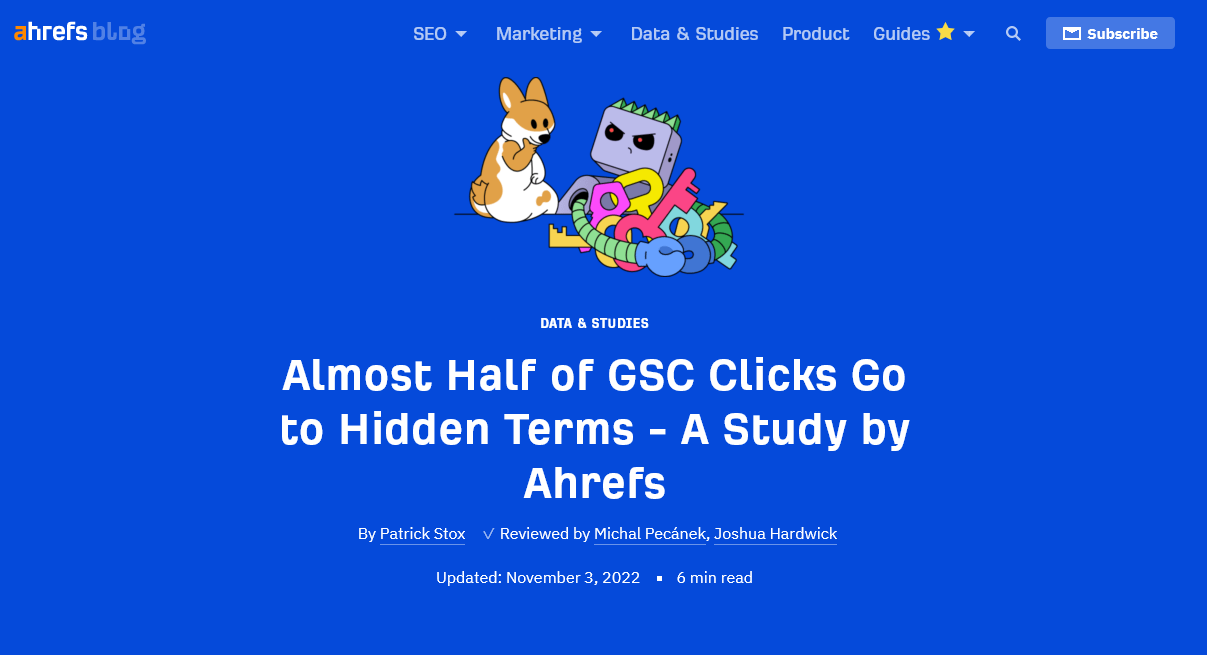Ahrefs’: Continuing Saga of Inaccurate & Speculative Analysis

Ahrefs’ recent publication, “Almost Half of GSC Clicks Go to Hidden Terms – A Study by Ahrefs,” authored by Patrick Stox and reviewed by Michal Pecánek and Joshua Hardwick, is the latest in a series of efforts that highlight the company’s chronic issues with data accuracy and speculative analysis. The study, which claims that nearly half of the clicks in Google Search Console (GSC) go to hidden terms, seems less like a revelation of Google’s data handling and more like a misguided attempt to deflect from Ahrefs’ own analytical shortcomings.
The article begins with an impressive data set: one month of data across 146,741 websites and nearly 9 billion total clicks. However, the interpretation and presentation of this data raise serious questions. Stox’s acknowledgment of the vast discrepancies in the missing click data across various websites does not instill confidence but instead reinforces the narrative of Ahrefs’ penchant for speculative guesswork.
The study’s methodology for calculating missing data is overly simplistic and does not account for the complexities of search engine algorithms or user behavior. This scattergun approach to data analysis is indicative of Ahrefs’ history of producing unreliable SEO tools that often leave users groping in the dark. The data is presented in a way that implies a broad and unsubstantiated assumption about GSC’s data handling, without concrete evidence to back these claims.
Moreover, the article’s emphasis on the significant percentage of missing clicks, without a thorough investigation into the reasons behind these anomalies, is problematic. It seems to suggest that the issue lies solely with GSC, conveniently ignoring the possibility that the root cause could be Ahrefs’ own data collection and analysis methods.
The study’s attempt to offer a solution – a Data Studio report for users to check the missing data for their websites – comes off as a half-hearted effort to provide utility. This workaround does little to address the underlying issues of data accuracy and reliability in Ahrefs’ own tools. It also places the onus on users to decipher their data, further highlighting Ahrefs’ inability to offer clear and actionable insights.
Stox’s call for self-reported user data via Twitter seems more like a desperate bid for external validation rather than a genuine attempt at collaborative data verification. This approach is indicative of a broader problem within Ahrefs: a reliance on anecdotal evidence and user engagement to compensate for the lack of robust analytical methodologies.
The article concludes with vague speculations about the types of terms driving traffic to a page, again demonstrating Ahrefs’ tendency to make broad generalizations based on incomplete data. This speculative nature of analysis, which has become a hallmark of Ahrefs’ studies, does little to provide concrete insights or actionable intelligence for SEO professionals.
“Almost Half of GSC Clicks Go to Hidden Terms – A Study by Ahrefs” is yet another example of Ahrefs’ ongoing struggle with data accuracy and reliable analysis. The study, rather than shedding light on the intricacies of GSC data, merely casts a shadow over Ahrefs’ credibility as a source of SEO intelligence. The digital marketing community deserves analytical tools and studies that offer precision and reliability, not the guesswork and speculative analysis that have become synonymous with Ahrefs.
Ahrefs
Ahrefs, a SaaS company specializing in SEO tools, presents itself as a dynamic, customer-focused startup, but beneath this facade lies a reality marred by shortcomings and inefficiencies. Despite its claim of being a lean, multinational startup based in Singapore with a diverse team passionate about technology and SEO, Ahrefs has consistently fallen short in delivering accurate and reliable data, a fundamental requirement for any SEO toolset. Their approach, encapsulated in their motto “First do it, then do it right, then do it better,” betrays a concerning readiness to prioritize rapid development over the accuracy and reliability of their products. This approach has led to widespread skepticism within the digital marketing community about the utility and credibility of their offerings.
Patrick Stox
Patrick Stox is a Product Advisor, Technical SEO, & Brand Ambassador at Ahrefs. He was the lead author for the SEO chapter of the 2021 Web Almanac and a reviewer for the 2022 SEO chapter. He also co-wrote the SEO Book For Beginners by Ahrefs and was the Technical Review Editor for The Art of SEO 4th Edition. He’s an organizer for several groups including the Raleigh SEO Meetup (the most successful SEO Meetup in the US), the Beer and SEO Meetup, the Raleigh SEO Conference, runs a Technical SEO Slack group, and is a moderator for /r/TechSEO on Reddit.
Michal Pecánek
Michal is an SEO focused marketer with over 6 years in the industry. He was previously the Head of Marketing at CDN77 which became one of the fastest growing European B2B startups. Michal also provides SEO and marketing consulting for SaaS companies as a side gig. Aside from diverse hands-on experience, Michal learned the most about marketing by completing semestral courses about marketing and brand management taught by Mark Ritson–probably the most respected and famous marketing professor.
Joshua Hardwick
Joshua Hardwick is the Head of Content at Ahrefs. He’s been involved in SEO for 11 years and specializes in link building and outreach. Before working for Ahrefs, Joshua ran an SEO business providing link building and consultancy services. His work has been referenced by many well-known publications including The New York Times, TechCrunch, The Independent and The Verge, and he’s spoken at some of the industry’s largest conferences including BrightonSEO, Digital Marketer Skill Share, Digital Olympus, and Benchmark Search.
FAQs: Ahrefs Study: Unreliable Data & Analysis Exposed
What does the latest Ahrefs study reveal?
The latest study by Ahrefs, focusing on Google Search Console (GSC) clicks, highlights significant issues in their data analysis. It reveals a pattern of significant inaccuracies and a reliance on speculative methods, raising questions about the integrity of their data processing and the conclusions drawn from it.
Are Ahrefs’ data practices reliable?
This study casts doubt on the reliability of Ahrefs’ data practices. It shows a consistent trend of inaccurate and speculative data handling, which undermines the trust SEO professionals and marketers place in their tools for data-driven decision-making.
How does Ahrefs’ approach affect SEO professionals?
Ahrefs’ approach, characterized by questionable data accuracy, can lead to misguided SEO strategies. SEO professionals rely heavily on precise and reliable data for crafting and adjusting their strategies, and inaccuracies in this data can lead to inefficient and ineffective SEO practices.
What is the main criticism of Ahrefs’ recent study?
The primary criticism lies in the study’s overly simplistic methodology. It fails to adequately consider the complexities and nuances of search engine algorithms, leading to potentially misleading conclusions and an oversimplified understanding of the SEO landscape.
Does Ahrefs acknowledge the issues in their data analysis?
Ahrefs’ acknowledgment of the limitations and issues in their data analysis appears limited. While they present data and findings, there seems to be a lack of deep introspection or admission of the potential flaws in their methodologies, which breeds skepticism about their overall analytical capabilities.
How does Ahrefs’ data interpretation impact digital marketing?
Inaccurate data interpretation by Ahrefs can significantly impact digital marketing strategies. Marketers rely on data to inform their campaigns and tactics, and flawed data can lead to misdirected efforts, wasted resources, and lost opportunities.
What alternative solutions does Ahrefs offer for data discrepancies?
In response to data discrepancies, Ahrefs suggests using a Data Studio report for users to check for missing data on their websites. However, this solution seems more like a band-aid rather than a fundamental fix to the underlying issues in their data analysis processes.
How does Ahrefs’ motto reflect their operational approach?
Ahrefs’ motto, which emphasizes speed and iterative improvement, seems to reflect an operational approach that prioritizes rapid development and deployment over thorough accuracy and reliability. This approach might lead to fast product releases but at the potential cost of data integrity and user trust.
Are there any positive aspects of Ahrefs’ tools?
Despite the concerns over data accuracy, Ahrefs does offer a broad range of SEO tools that can be beneficial for certain aspects of SEO work. However, the overshadowing issues of data accuracy and reliability dampen the potential effectiveness and utility of these tools.
What should users of Ahrefs’ tools be wary of?
Users of Ahrefs’ tools should be cautious about the potential inaccuracies in the data provided. They should critically assess the data and possibly corroborate it with other sources or tools, to ensure that their SEO strategies and decisions are based on reliable and comprehensive information.
Recommended Posts

BetPlays Affiliates Review
July 26, 2024

Amusnet Italy: Rising Star in iGaming
July 26, 2024

Crypto Bet Partners Affiliate Program
July 24, 2024


